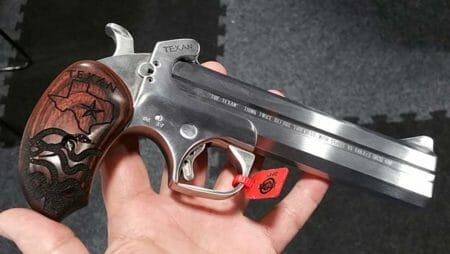

Austin, TX -(Ammoland.com)- The legislators and gun-control activists who incessantly parrot the claim that Senator Brian Birdwell (R-Granbury) is pandering to Baylor University (the largest employer in his district) by exempting private colleges from his “campus carry” legislation (SB 11) are clearly hoping voters won’t remember that the language exempting private colleges originated in campus carry legislation by former Senator Jeff Wentworth (R-San Antonio), whose district encompassed the state’s fifth-largest public university but no large private universities.
During the Wednesday, March 18, floor debate on Senate Bill 11, Senator Rodney Ellis (D-Houston), remarked to Senator Birdwell, “It is interesting that you would put this in public universities—in other people’s districts—but not private, when the largest employer in your district is a private university.”
This is a favorite talking point among opponents of the bill, but it ignores the fact that the opt-out language for private universities originated in Senator Wentworth’s committee substitute to his 2009 campus carry bill (SB 1164). Senator Wentworth included the same language in his 2011 campus carry bill (SB 354), and Senator Birdwell repeated it in his 2013 bill (SB 182). Because Senator Wentworth’s district encompassed the town of San Marcos—home to Texas State University—but did not include any large private universities, there is no evidence that the language is intended to create a carve-out for Baylor or any other individual institution.
Madison Welch, Southwest regional director for Students for Concealed Carry, commented:
Opponents hope to derail this bill by pushing the false narrative of a “double standard,” but the reality is that the ability of private colleges to operate free of many of the restrictions placed on public colleges is fundamental to the existence of private colleges. When you consider that private colleges have wide latitude to require church attendance, enforce morality codes, and place restrictions on students’ freedom of speech, it makes sense that those same institutions would be allowed to restrict the rights of concealed handgun license holders on campus. If that is a double standard, it’s the same double standard that always exists between private property and public property. There is nothing unethical or unusual about allowing private property owners to set their own policies but requiring state-funded colleges to honor state-issued licenses.
The double-standard narrative is one of two popular talking points among opponents of campus carry. The other is that campus carry would place a heavy financial burden on Texas colleges. For example, the University of Houston recently claimed it would need $3 million for the first year and $1.2 million for each subsequent year, to build and staff secured storage facilities to house the guns of concealed handgun license (CHL) holders living in on-campus dorms.
Ignoring the fact that Senate Bill 11 does not mandate secured storage facilities and would allow UH to continue its current policy of requiring CHL holders living in dorms to store their handguns in their locked vehicles parked on campus, the university’s cost estimate is beyond absurd. The number of UH dorm residents with concealed handgun licenses can be estimated using statistics from the University of Texas at Austin.
According to Austin NBC news affiliate KXAN, only 2.5% of the students living on campus at UT-Austin are 21 or older. According to the UT-Austin website, the university has an on-campus housing capacity of 6,956. If we take 2.5% of 6,956, that’s 174 on-campus residents who are 21 or older. Because 9.5% of UT-Austin students are foreign nationals, we’re looking at about 157 who are eligible for a Texas CHL. If we use the rate (1.3%) at which Texans age 21-23 are licensed to carry a concealed handgun, to estimate how many of those 157 students are CHL holders, we can calculate that there are approximately two CHL holders living in on-campus housing at UT-Austin.
According to a 2013 article in the Houston Chronicle, UH has a dorm capacity of 8,008 students, which is just 15% greater than that of UT-Austin. Assuming that the demographic makeup of UH is comparable to that of UT, we can estimate that UH has between two and three CHL holders living in on-campus dorms (2.4 using the exact percentages from UT; 2.6 if we don’t discount for foreign nationals). This means the University of Houston claims to need $1.5 million to $400,000 per year per handgun.
Welch quipped, “The university could save at least fifty percent by buying each of the CHL holders a house to live in.”
About Students for Concealed Carry
Students for Concealed Carry (SCC) is a national, non-partisan, grassroots organization comprising college students, faculty, staff, and concerned citizens who believe that holders of state-issued concealed handgun licenses should be allowed the same measure of personal protection on college campuses that current laws afford them virtually everywhere else. SCC is not affiliated with the NRA or any other organization.
For more information on SCC, visit ConcealedCampus.org or Facebook.com/ConcealedCampus.

